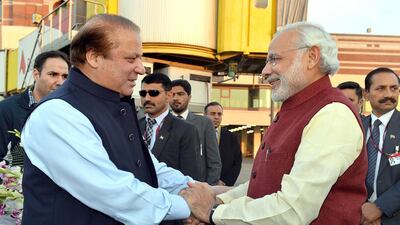On Christmas Day, Indian prime minister Narendra Modi made an unexpected, unscheduled and most surprising visit to Lahore. He was received by the Pakistani prime minister, Nawaz Sharif, whose birthday falls on that date. It was also the day that Mr Sharif’s granddaughter was married.
Mr Modi was invited home by his counterpart with the customary Lahore hospitality and, after a brief but pleasant visit, flew on to New Delhi.
Since his election in 2014, Mr Modi has generally been hostile towards Pakistan. In fact, it appeared on occasions that he was determined to embarrass his counterpart, Mr Sharif.
What caused the volte face? Analysts on both sides of the border are still speculating.
Some, such as the former Indian diplomat MK Bhadrakumar, think it was due to American pressure.
Others hint at quiet diplomacy, claiming that Mr Modi’s previous hostility was due to pressures from within his Hindu-nationalist BJP party. Some have even hinted that this overture from Mr Modi is due to certain reassurances made by the Pakistan army. I think the earlier theories are possibilities, but the last one is difficult even to consider.
I also find it difficult to accept the contention of those analysts who feel that Mr Modi found himself in an impossible situation and, against his own wishes, was pressured into adopting a strong anti-Pakistan position.
Those commentators who are not enamoured of Mr Modi have expressed the view that he is intent on facilitating overland access from India to Afghanistan to benefit Indian businesses with interests in Afghan iron-ore mines. This is certainly a possibility.
Commenting on Mr Modi’s visit to Lahore, Indian essayist Pankaj Mishra said that “believing that Modi’s Christmas mission will produce a great and enduring bonanza, including his own change of heart, may be a bit like believing in Santa Claus”.
Then what happened? I admit that I, too, am guessing. But my basic premise is that all politicians are usually more sensitive to domestic pressures, particularly those that might have an effect on future elections.
While the extent of Mr Modi’s success in the April-May 2014 elections was a surprise, it should not have been. He adopted a bold, unapologetic stance for the anti-Muslim riots that happened in Gujarat under his watch as chief minister, and he did not display any desire to soften his attitude towards Pakistan during his campaign for election as prime minister.
Much of his success can be attributed to across-the-board rejection by the Indian electorate of the corrupt and inept Congress leadership which had long held the reins of government.
But that was not all. Mr Modi was elected despite his anti-Muslim background because he promised a “shining India”. His country was desperate for an economic recovery, and his economic record as chief minister of Gujarat from 2001 to 2014 was most impressive.
However, a year and a half down the line, India is far from shining. Many Indians who expected Mr Modi to grow in stature as a statesman after the elections have been disillusioned.
He seems to have met very few of the expectations that many Indians had of him. Many respected people have protested against growing Hindu extremism in India, which they accuse Mr Modi of fostering.
Meanwhile, thanks to the China-Pakistan Economic Corridor (CPEC), Pakistan seems to be economically on the rise.
One of Pakistan’s greatest geostrategic strengths is its location as the junction of the Middle East, Central Asia and South Asia. For that reason alone, Indian overland access to resources, particularly energy, is dependent on Pakistan.
I think Mishra’s reasoning is the most accurate in this context. He says: “The key to Modi’s chameleon-like behaviour lies in the realisation that he is, as his own senior colleague, LK Advani, pointed out, a ‘brilliant and efficient events manager’.”
Mishra notes that Mr Modi rose quickly in the staid world of Indian politics partly because he was the first politician to recognise the imperative of inserting himself into the 24-hour news cycle, of manipulating social media and hosting massive spectacles to impress the rich, powerful and influential.
But that is not all. If India is to benefit from CPEC and/or gain access to Central Asia, it cannot do so without Pakistan. And, after trying Iran as an alternative, Mr Modi has surely realised that Pakistan is its only economically viable option.
I am as sceptical as Mishra and others and doubt that Mr Modi has had a genuine change of heart towards Pakistan. However, he has understood how politically weakened he is and he is desperate to deliver on the economic front.
It is within these parameters that Pakistan can work with him; very carefully and cautiously, weighing each option well and from every angle before it falls for his wooing.
Brig Shaukat Qadir is a retired Pakistani infantry officer

